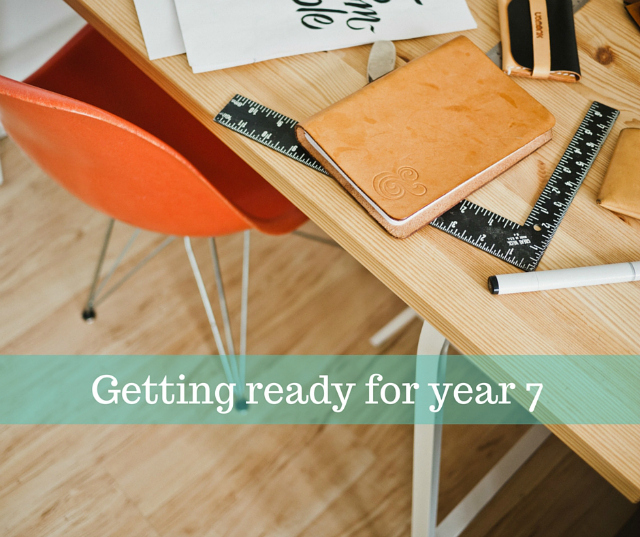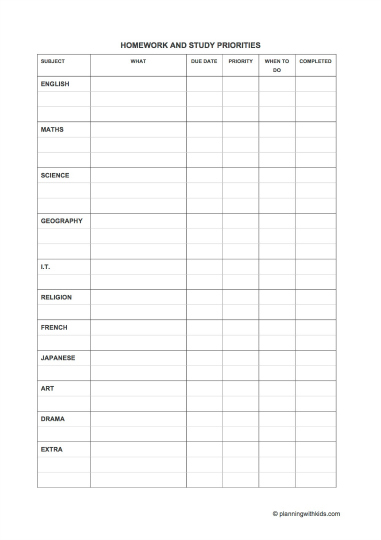
Next year I will have more kids in secondary school than I do in primary school. This blows my mind (and makes me feel old!). Yesterday I saw a mum with a preschooler by her side, a baby in the pram and a toddler on a board attached to the pram. I can still remember those days clearly.
While I write yearly about whether or not it gets easier as kids get older, yesterday when I stood next to this gorgeous family and waited for the traffic lights to change, I was in my running gear had only the dog by my side and was running home from dropping the two younger kids off at school. As the baby cried and the preschooler was protesting about something, I thought yes it is easier!
But of course it is not all smooth sailing and like all stages of parenting it is at those transition stages that can be most challenging. Moving from primary school to secondary school is a challenging time for many kids. As a parent I see my role as one to support the child through this stage. It is not my role to manage it completely for them. It is a stage where they grow in independence and they need the chance to explore this stage, make decisions and make mistakes, so they can develop and mature.
Having had two kids transition through to year 7 already, I have some hindsight to use to support my daughter as she embarks on this stage. I am intrigued to see if there is much difference in boys and girls, though sometimes it is hard to tell what is personality and what is gender driven.
You can see posts I wrote about my previous experience with year 7 here which goes into more detail about some of the actual things to do and what you can possibly expect from your kids.
Now I am going to share my general approach in the lead up to the transition to help our kids get ready for year 7:
Encourage self organisation
Our daughter is quite organised, but a secondary timetable requires some new organisational skills in terms of what to take to school each day, what order to tackle homework in and simply how to be in the right place at the right time.
Encouraging her organisational skills with her current workload now and talking about what will be happening next year is useful in term 4. At the start of each week I recommend she looks at her workload plus extra curricular activities and work out how she will fit everything in.
I will also print off some copies of a homework prioritising template I created for our second son for her to start using. Our son found this a very useful tool in the first couple of months in terms of sorting out what to do when, it helped him feel less overwhelmed by the incoming demands. Most primary schools have a consistent pattern with homework – it is given at the start of the week and due on Friday for example. Secondary school runs completely differently with requirements due all the time and with no pattern, plus there are more tests to study for on top of the homework! You can download a copy and read more about it here.
Encouraging independence
Secondary school also symbolises children taking a step further onto the bridge of adolescence. For me encouraging independence means allowing them to take on more responsibility and have increased freedom. It is a time to check boundaries that have been set and work out if adjustment is needed.
Our daughter is already very independent in terms of waking herself up each morning, getting herself to and from school via public transport and making sure she has everything she needs for school and her extra curricular activities each day. We are now having discussions about new things she will be able to do (and be expected to do) next year like making her own lunch.
If it is your first child entering secondary school this article on Supporting your teenager’s growing independence by the Raising Children Network is worth a read.
Encouraging problem solving
I think one of the biggest gifts we can give our kids is the skills and encouragement to solve their own problems. I don’t mean we leave everything for them to work out for themselves, but I mean as they get older we say less, listen more and encourage them to work through solutions to solve the many issues that arise in the life of a secondary school student.
For some kids, this comes quite naturally, they think of options, work out what might work best and give it a go. For others, they don’t even know where to start when it comes to solving a difficult issue. For these types of kids, teaching them a framework or a process for solving problems can be super helpful.
I have used this type of approach:
- Articulate and define the problem – sometimes just this step can be helpful to kids!
- List possible solutions – encourage them to have more than one! Aiming for around three options works well as it means they have had to give adequate time to think about the problem. If they find this hard, ask if they want help brainstorming solutions – don’t offer solutions without asking even if the solution seems completely obvious to you! I also try to not give a solution outright but use questions (leading if they need to be) to help them find possible solutions. And at this stage they are just possible solutions and ideas, they don’t have to be perfect.
- Assess the possible solutions – teach them to work through their solutions and assess the potential positive and negative impacts they may have.
- Choose the best option – notice this is the best option, not the perfect option. If they have undertaken step 3 they will know that there is an element of risk (potential negative impact) associated with it.
- Take action – sometimes solutions mean doing hard things, support them to take action in a timely manner.
- Review the solution – did the solution have the desired results? Great! If not what could they do differently next time. The review is not a time for self criticism or criticism from me, this will only make them risk adverse and less confident in trying to solve their own problems, but review is necessary to be able to learn and improve problem solving skills.
As they get used to solving problems, the less I need to be involved. The less it will also seem like they are following a framework as it will just become intuitive.

